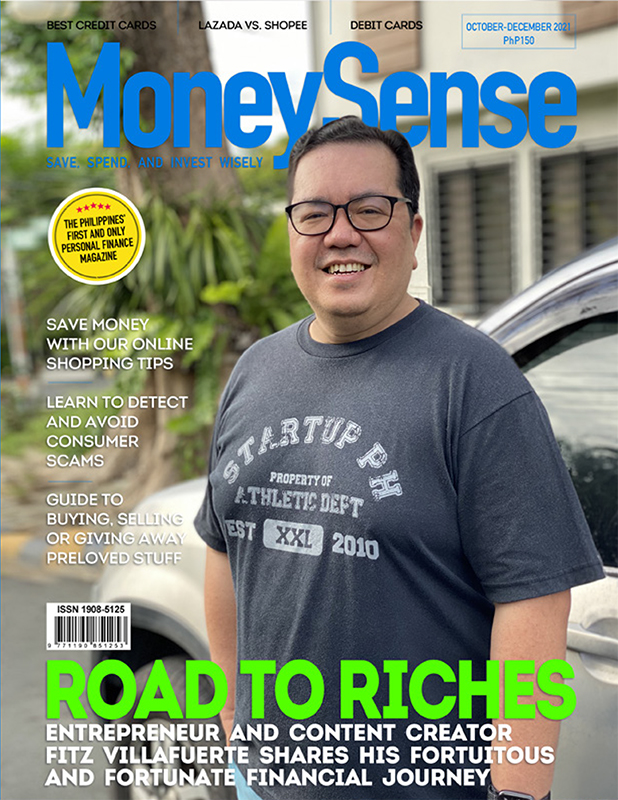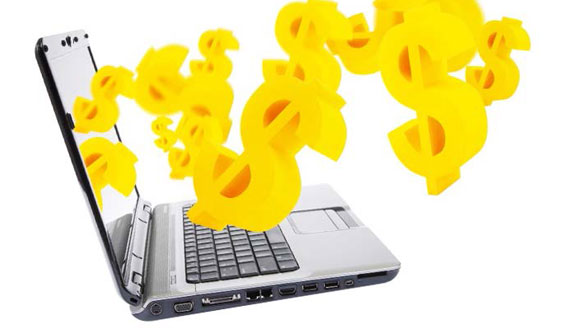MoneySense Q4 2021 Features Successful Entrepreneur Fitz Villafuerte

ROAD TO RICHES
Entrepreneur and content creator Fitz Villafuerte shares how his curious bent has led to his fortuitous and fortunate financial journey.
By EXCEL V. DYQUIANGCO
It is hard to pigeonhole Fitz Villafuerte. Best known as the personal blogger behind Ready to Be Rich, Fitz is also a serial entrepreneur, startup founder, investor, trader, content creator, podcaster, writer, speaker, and financial planner. Slasher, hustler, moneymaker—however you want to call him—he embodies the concept of multiple sources of income.
“I have always been achievement-driven and curious with whatever was presented to me,” Fitz shares. “When I was young, I played with whatever stuff was in the house. For example, I turned the chess pieces of my dad into an army. I let my imagination work, so I’m more open to experiences; I’m always excited to learn something.”
7 Things Worth Spending For
Personal finance pundits sometimes make spending money sound like it’s a bad thing. Don’t overspend. Don’t go over budget. Stop buying lattes. Be thrifty. But it’s not spending that’s a problem. It’s on what and how much that is.
If you keep buying the latest gadget when what you have still works perfectly, the priciest luxury bag that sits in your wardrobe practically the entire year, or the hottest sneakers that are already out of fashion a couple of months after, then you have a problem. So, what should you spend your money on? Here’s what I recommend:
1. Experiences. Research has shown that spending on experiences gives us longer-lasting happiness than material things. Travel, for instance, is worth spending money on. The experience itself—seeing new sights, eating new food, and discovering a new culture—brings a lot of joy. But the great thing about traveling is the giddy anticipation before the travel and the fond reminiscence after both extend your happiness per buck. Other experiences to spend on include simpler and cheaper activities, such as visiting a museum, watching a funny movie, playing sports, or just walking in the park on a cool morning.
2. Things That Spark Joy. Organizing consultant and author Marie Kondo got it right: keep only things that spark joy. It applies too to what to spend on. So, while possessions generally do not give as much happiness as experiences, certain material things are worth paying good money for. For example, I bought an expensive massage chair and La-Z-Boy chair years ago. There is not a single day I don’t use them. They help me relax after a hard day’s work. They are worth every peso. I also enjoy great design, whether Japanese or Scandinavian. That is why I’m willing to pay a bit more on a kitchen appliance or houseware that looks beautiful. The conclusion: possessions can bring happiness if you use them frequently and continuously add to your quality of life.
3. Things That Save You Time. Happiness and money experts agree: your money is well spent on things that will save you time. Why do your laundry manually when a washing machine can do that for you? Why wash your car if you can take it to a car wash? So, buying appliances and other stuff and hiring services that can save you time is worth spending for. Of course, if you enjoy doing this stuff or it does not take much of your time, go ahead and do it yourself. For example, I enjoy doing chores like washing the dishes and washing the cars, which I consider both exercise and alone-time (while listening to music or podcasts or watching Netflix shows). But I am willing to pay good money for serious auto detailing—something that I don’t have the time, ability, and cleaning materials for. Speaking of auto, a car may be an expensive, depreciating property. But given the alternative of commuting in our messy public transportation system, it’s worth spending on.
4. Health. It’s a cliché, but health is wealth. Healthy, organic whole foods can be more expensive. Vitamins and supplements are not cheap. Gym membership costs a lot. But it’s better to spend on them now rather than spend on even more costly hospitalization and medicines later. Of course, there are cheaper ways to spend on your health. Planting your fruits and vegetables is one such way. Just walking, doing equipment-free strength exercises, and actively moving throughout the day doesn’t cost anything. And by the way, health includes your mental health. So going to a spa, paying for therapy, or going out with your family or friends to save your sanity all count.
5. Education. Benjamin Franklin famously said, “An investment in education gives the best returns.” You are your best moneygenerating asset. So, it makes sense to invest in your continuing education. Sure, there are plenty of free resources online. But be willing to pay for premium training, including conferences, webinars, courses, and books. Change your mindset that you will only attend or read something if it’s free. If you buy junk food and junk entertainment, why wouldn’t you pay for your professional development? The same goes for your children: if it’s something that will broaden their knowledge and skills, do it.
6. Investments. Anything that generates a return is worth spending your money on. Buy stocks, funds, and bonds. Invest in real estate and your own business. Of course, there is always a risk in investing. That’s where investing in your education comes in. Don’t get into anything you don’t understand. Contrary to what other experts say, buying your own home can be an investment (and not a liability). People have sold their homes or the property inherited from their parents for a very hefty sum. Is your house not an asset? I disagree.
7. Others. Behavioral psychologists have proven that spending money on others brings more happiness than spending on ourselves. When you help others financially, your generous deed not only blesses them; it blesses you. You get the joyful glow of being able to help someone in need. So, why not set aside funds in your budget for giving to others, whether to individuals in your circle of influence or to organizations such as your local church or a non-profit that shares your values.
See? Spending is not necessarily a bad thing, as long as you do it wisely.
Editor-in-Chief
hbulos@moneysense.com.ph





